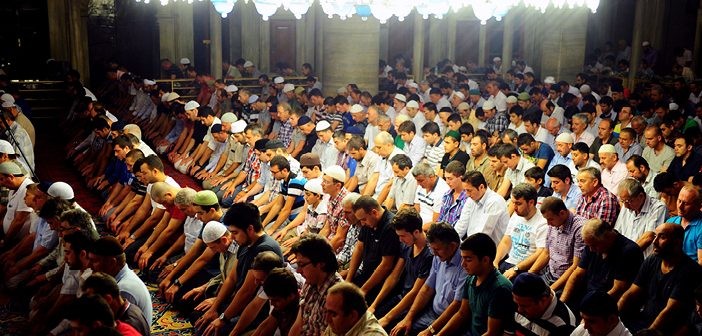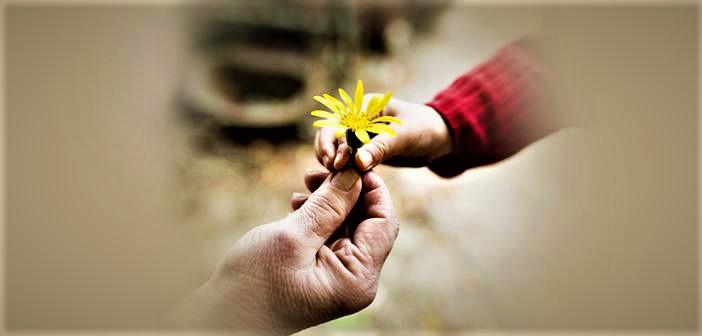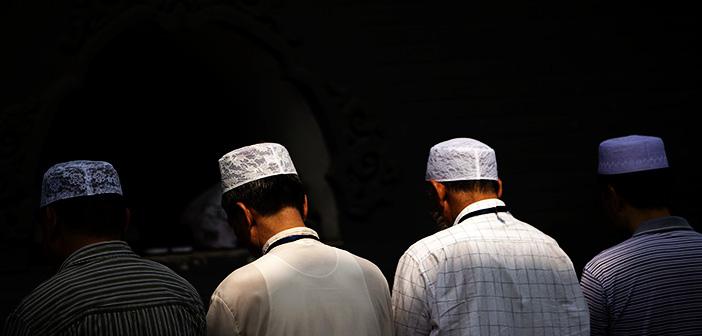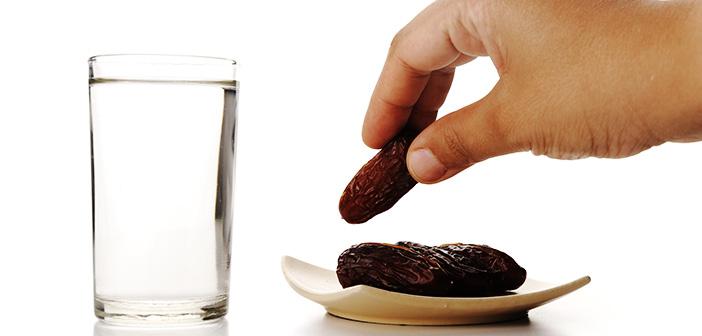
Love of the Prophet and Salawat-u Sharifa
“Allah and His angels send blessings on the Prophet: O Believers! Send your blessings on him and salute him with all respect!” (al-Ahzab, 56)
It is impossible for us to fully comprehend the Blessed Prophet -upon him blessings and peace-, a masterpiece of creation, within our capacities and power as human beings. The impressions we receive from the world would prove deficient in both understanding and explaining him. Just as it is impossible to pour the entire ocean inside a cup, it is impossible to properly understand the Muhammedan Light. Accentuating this is the following ayah:
“Allah and His angels send blessings on the Prophet: O Believers! Send your blessings on him and salute him with all respect!” (al-Ahzab, 56)
Compliant with the Divine edict commanded through the above ayah, we are required to utter salawat-u sharifa, with sending our blessings to and saluting that Prophet -upon him blessings and peace-, with whom the universe boasts. This is part of the conduct the Almighty commands the entire ummah to uphold and practice with respect to the Blessed Prophet -upon him blessings and peace-. It is a necessity of iman to draw closer to the grace and perfection of that great Prophet -upon him blessings and peace-, saluted and blessed by Allah, glory unto Him and His countless angels. For the Almighty states:
“Say (O Messenger): If you love Allah, then follow me, Allah will love you and forgive you your faults, and Allah is Forgiving, Merciful…” (Al-i Imran, 31)
The moment a believer begins to tremble before the spiritual presence of the Blessed Prophet -upon him blessings and peace- sense inexpressibly beautiful feelings budding in his heart and empties his spirit of all the appearances and shadows of the ego, he is surely on the way of acquiring a share of his love and exemplary character. To this day, the heroes of the heart from among the ummah, who have been able to acquire a share of his sacred character to the point of becoming one with it, have beautifully shown their love for the Blessed Prophet -upon him blessings and peace-.
Muslims continue to cherish those who reach the source of love, the Lord and His Messenger, until the Final Hour, lovingly remembering them with warm prayers even after they pass away. Of countless such devotees of the Prophet -upon him blessings and peace- privileged with this rank, the experiences of two such figures are ever etched in memory.
During his time, the Noble Prophet -upon him blessings and peace- used to send teachers to neighboring tribes, to communicate and teach the religion of truth. Some of these teachers, however, had fallen victim to sinister plots, one of which took place in the tragedy known as Raji.
The tribes of Adal and Qari had asked for teachers from the Blessed Prophet -upon him blessings and peace- to educate them in Islam. In response, the Noble Messenger -upon him blessings and peace- sent an envoy of ten Companions. But when the envoy arrived near Raji, they were ambushed. Eight were martyred, while the remaining two were surrendered to the idolaters of Mecca.
The two Companions who had fallen captive were Zayd and Hubayb -Allah be well-pleased with them-. The bloodthirsty idolaters eventually martyred both. Moments before his execution, Zayd -Allah be well-pleased with him- was asked by Abu Sufyan:
“Would you have wished for your Prophet to be in your place right now if you knew you would be spared?”
Zayd -Allah be well-pleased with him- looked at Abu Sufyan with pity and replied “Never…! I could not even bare the thought of him being spiked by a thorn in his foot in Medina, let alone hoping him to be in my place right now!”
Stunned by the response, Abu Sufyan could not help but confess, “I swear, I have never seen anyone loved more by his friends than Muhammad!”
Afterward, they went next to Hubayb -Allah be well-pleased with him-, assuring him that he would be released provided he renounced his faith.
“Not even if you were to give me the world entire”, he responded. The idolaters then repeated to him the question they had moments before asked Zayd -Allah be well-pleased with him-. They received a similar response.
Hubayb -Allah be well-pleased with him- only had one last wish before he was martyred: to send a loving greeting to the Messenger of Allah -upon him blessings and peace-!
Yet, with whom could he send his message? There was not a single Muslim near him. Almost despondent, he turned his gaze towards the skies and pleaded:
“My Lord! There is nobody around to deliver my greetings to the Messenger of Allah. You deliver my greetings of peace to Him!”
Sitting with his Companions in Medina at the time, the Blessed Prophet -upon him blessings and peace-, out of nowhere said, in an audible tone, ‘ وَعَلَيْهِ السَّلاَمُ’, ‘Peace be upon him, too!’
“Whose greetings did you just respond to, Messenger of Allah?” the Companions wondered.
“That of your brother Hubayb”, said the Blessed Prophet -upon him blessings and peace-.
Eventually, the idolaters viciously tortured both Companions to martyrdom. The final words of Hubayb -Allah be well-pleased with him- are momentous:
“Dying in this way or that is of no concern, if death comes while a Muslim!”[1]
There…the love and courage of the Companions! They felt little fear at the face of a terrifying scene enough to leave anyone in dread. Their entire concern was to capture the attention of the Blessed Prophet -upon him blessings and peace-. And in the end, their sincere and heartfelt greetings were delivered to their destination, escorted by the Lord Himself. Below is another wonderful example exposing the love and yearning of the Companions for the Noble Messenger -upon him blessings and peace-.
Abdullah ibn Zayd al-Ansari once came next to the Blessed Prophet -upon him blessings and peace- and bemoaned:
“You to me, Messenger of Allah, are dearer than everything I own, my children, my family and even myself. Had there not been the fortune of being able to see you, I would have wished to have been dead!” He was then reduced to tears.
“Why are you crying?” asked the Blessed Prophet -upon him blessings and peace-.
“I am crying” replied Zayd -Allah be well-pleased with him- “thinking that you, too, will one day pass away and join the high rank with all the other prophets, while I, even if I were to enter Paradise, will be somewhere lower and hence not be able to see you anymore!”
The Blessed Prophet -upon him blessings and peace-, that ocean of compassion, chose to remain silent awhile. There arrived, in the meantime, the following revelation:
“And whoever obeys Allah and the Messenger, these are with those upon whom Allah has bestowed favors from among the prophets and the truthful and the martyrs and the good, and goodly company are they!” (an-Nisa, 69)
Years later, as Abdullah ibn Zayd al-Ansari -Allah be well-pleased with him- was working away in his garden one day, his son came running and gasping for breath, informed him of the passing away of the Grand Prophet -upon him blessings and peace-, mournfully. Traumatized, Zayd -Allah be well-pleased with him- made the following wish:
“My Allah…Take my sight away, here and now, so that from here on, I do not see anyone else other than my one and only beloved, the Messenger of Allah -upon him blessings and peace-”
His prayer was immediately accepted. He lost his sight there and then.[2]
Love and affection is a like line of electricity that runs between two hearts. Lovers never leave the thought of their beloved out of their hearts and their reminiscence distant from their tongues. Up until the moment of death, they live their lives with a peace of mind brought by the level of sacrifice they have shown, with the calming satisfaction of knowing they have disposed of their wealth and entire existence in the way of the beloved. The ayah declares: “And keep up salat, pay the alms and obey the Messenger, so that mercy may be shown to you.” (an-Nur, 56)
It is imperative to adhere to the Beloved Prophet -upon him blessings and peace-, the quintessential example, through and through; in line with the principle “A lover is infatuated with everything that the beloved is fond of”. Loving and adhering to him is the backbone of Divine Love.
Directly followingلاَ اِلهَ اِلاَّ الله (There is no God but Allah) in the Word of Tawhid, in the profession of faith, are the words مُحَمَّدٌ رَسُولُ الله, (Muhammad is His Messenger). Each Word of tawhid, every salawat is an investment towards acquiring the love of and nearness to the Real. It is this investment that yields the greatest joy both Here and in the Hereafter, that opens the door to all spiritual conquests. The universe is a manifestation of Divine Love. The core essence of this manifestation is the Light of Muhammad, the love of whom is the only road to the Essence of the Divine.
The spirituality of worship, the elegance that pervades behavior, the courtesy that governs morals, the delicacy of the heart, the beauty shone upon appearance, the exquisite charm of languages, the grace that permeates feelings, the profundity of gazes, and in short, all beauties are but sparkles of the love of that Light of Being -upon him blessings and peace- mirrored unto hearts.
Mawlana Rumi beautifully echoes this: “Come, o heart, to the real festival that is union with Muhammad…for the light you see in the universe is but a glow from the face of that Sacred Being.”
Repeating salawat-u sharifa, at all times and places but in particular at dawn, is of immense importance in allowing the grace of Divine inspiration to leave its impression on the heart, to reinforce the bond with the Blessed Prophet -upon him blessings and peace- and allow one to imitate him spiritually.
The righteous, revived by the reality of the Prophet -upon him blessings and peace-, have enumerated the benefits of saluting the Noble Messenger -upon him blessings and peace- and thereby gaining closeness to Allah, glory unto Him, as follows:
- A person will have complied with the Divine Command and at the same time complemented the salawat of the angels. The ayah declares: “Allah and His angels send blessings on the Prophet: O Believers! Send your blessings on him and salute him with all respect!” (al-Ahzab, 56)
It goes without saying that there is a difference of meaning between the Almighty’s salutation of the Blessed Prophet -upon him blessings and peace- and the angels’ salutation of him, as well as ours. The salawat of the Almighty is for Him to show mercy to His Messenger and elevate him. The salawat of the angels is for them to pray for his forgiveness. Our salawat, the salawat of his ummah, in contrast, is to pray for the Blessed Prophet -upon him blessings and peace-.
- It is a means of being forgiven for sins.
The Blessed Prophet -upon him blessings and peace- avows: “Whosoever salutes me once, Allah salutes him ten times, erases ten of his sins and elevates him ten degrees.” (Nasai, Sahw, 55)
- It is a means for drawing closer to the Noble Messenger -upon him blessings and peace- on the Day of Judgment.
“The closest to me on the Day of Judgment”, says the Blessed Prophet -upon him blessings and peace-, “are those bless and salute me the most.” (Tirmidhi, Witr, 21)
- The Blessed Prophet -upon him blessings and peace- personally responds to a person who sends him salawat. He has said:
“Allah restores me with my spirit to allow me to reply to the salawat one sends to me.” (Abu Dawud, Manasiq, 96)
- The name of each person who sends a salawat is presented to the Blessed Prophet -upon him blessings and peace-.
“Allah has angels, who journey Earth. They deliver to me the greetings from my ummah at the instant.” (Nasai, Sahw, 55)
- Since a person who sends salawat has effectively preferred the love of the Prophet -upon him blessings and peace- over any love else, he takes a great step towards embodying his conduct and eventually attains to virtue by shedding his bad habits.
- Not only does the Prophet’s -upon him blessings and peace- love for such a person increase, his love for the Blessed Prophet -upon him blessings and peace- is also preserved and continues to grow.
- In spite of the incalculable blessings Allah, glory unto Him, has bestowed upon us through the Blessed Prophet -upon him blessings and peace- and the impossibility for us of ever repaying that, through salawat-u sharifa, we will have at least showed our appreciation and taken a humble step towards giving thanks.
- It is a means for the arrival, upon us, of the mercy of Allah, glory unto Him. The Beloved Prophet -upon him blessings and peace- states:
“Whosoever salutes me once, Allah will show mercy on him ten times the amount.” (Muslim, Salat, 70)
- It is a cause to recollect what is forgotten.
- It is a means for the acceptance of prayers.
The Blessed Prophet -upon him blessings and peace- once saw a man who, after offering salat, began praying without thanking Allah, glory unto Him, and saluting His Messenger.
“The man was too hasty”, he remarked, before calling the man next to him and saying, “Should one of you intend on making a prayer, let him begin with thanking and glorifying Allah and then proceed by blessing and saluting me. He can then pray in whichever manner he pleases.’ (Tirmidhi, Daawat, 64)
And in another hadith: “A prayer does not reach its destination until the person making the prayer sends a salawat to the Prophet.” (Munziri, at-Targhib wa’t-Tarhib, III, 165)
- It protects one from Divine reproach.
“Let the nose of he, who does not send me a salawat despite my name being mentioned next to him, be smothered in dirt.” (Tirmidhi, Daawat, 100)
- The Almighty will suffice for a person who has made a habit of saluting and sending blessings to the Beloved Prophet -upon him blessings and peace- in all his affairs, and will disperse his sorrow both Here and in the Hereafter.
Ubay ibn Qab -Allah be well-pleased with him- recounts:
‘I send you lots of salawat’u-sharifah, Messenger of Allah. How often should I do it?’ I one day asked.
‘As much as you wish’ he replied.
‘Would it be right if I spared a quarter of my prayer for it?’ I again inquired.
‘Spare as much from it as you wish’, he advised. ‘But it will be better for you if you spared more.’
‘Then I will spare half’, I proposed.
‘As you wish…But better if you spared more’, said he.
‘How about I spared two-thirds then?’
‘As you wish… But better if you spared more’.
‘How would it be then if I send salawat’us-sharifah in the entire time I spare for prayer?’ I then asked.
‘If you do’, the Messenger of Allah -upon him blessings and peace- replied, ‘then Allah will rid you of all your troubles and forgive your sins.’” (Tirmidhi, Qiyamat, 23/2457)
Salawat-u sharifa enables contact with the spirituality of the Blessed Prophet -upon him blessings and peace- and an opportunity to become illumined with his light. The reward of each salawat, on the other hand, is proportionate with one’s sincerity and love for the Blessed Prophet -upon him blessings and peace-.
O Prophet, O Messenger…An eternity of salawat and salam to You!
Dahilak ya Rasulallah…![3]
[1] See, Bukhari, Maghazi, 10; Waqidi, Maghazi, p. 280-281.
[2] See, Qurtubi, al-Jami li-Ahkami’l-Quran, V, 271.
[3] “I am in need for your intercession and mercy, Messenger of Allah!”
Source: Osman Nuri Topbaş, Sufism, Erkam Publications
EATING ACCORDING TO RELIGIOUS: HALAL FOOD
REPENTANCE AND PRAYER














